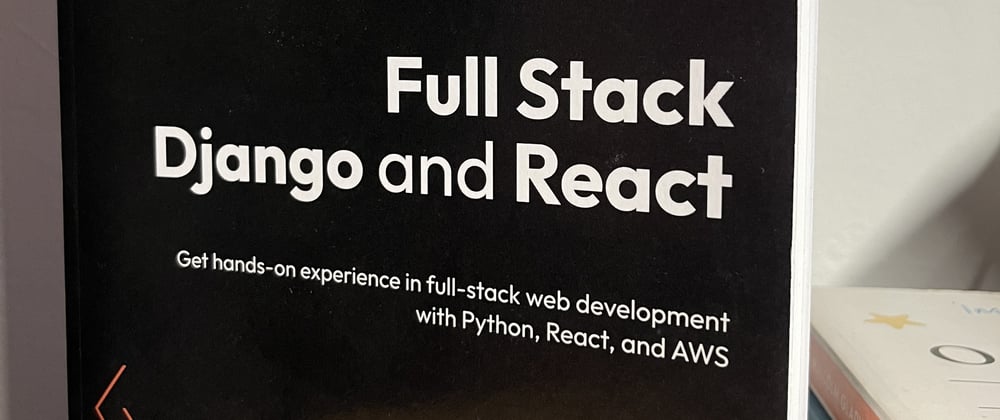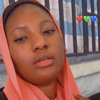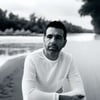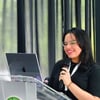At 22, four years into my software engineering career, I got a huge chance: to write a technical book about Fullstack programming with Django and React. In this article, I'll share how I got this opportunity, what the process was like, the challenges I faced, what I did right, and what I could have done better.
I hope this article helps aspiring authors create the best version of their book and also helps them not make some mistakes I made. Without further due, let's start with the article.
The Opportunity
In late 2021, Packtpub presented me with an offer to author a book on full-stack development utilizing Django and React. That was not my first collaboration with Packtput as I reviewed a few weeks ago the book Full Stack Development with Spring Boot and React - Third Edition written by Juha Hinkula. But going from a technical book reviewer to a technical author, initially, I experienced self-doubt:
Concerns about my youth and inexperience in book writing.
Awareness of the significant difference between a blog and a book.
Not enough years of experience in Software development.
However, I recognized these thoughts as impostor syndrome and chose to confront the challenge. My role focused solely on writing, not the marketing, publishing, or distribution aspects. I saw this as a potential boost for my professional profile.
The transition from blogging to book writing required adapting my approach. Unlike blogs where external resources can supplement explanations, a book demands comprehensive explanations and visuals. I studied various programming books, analyzing their techniques and integrating these into my style while maintaining the essence of my blog's content.
But the biggest challenge was the writing. How to condense enough information about Django, React, Docker, and AWS in a 420-page book? What does the thinking process look like?
The Process
Before starting the book, creating an outline is crucial. This long document outlines what will be covered, starting from the names of the three main parts, to chapter titles, down to the content of each chapter and what readers will learn from them. This is important for planning the book's content and getting early feedback, which is key to the book's success.
The writing process required patience, discipline, and creativity. I approached it by thinking of the book in terms of chapters and divided my process into three main steps:
First, doing research, writing the code, and then documenting the code.
Next, identify the more complex parts of each chapter and present them visually.
Finally, the writing and correction phase.
The last part is the most time-consuming. Writing a detailed 32-page chapter involves explaining the code, clarifying the concepts, describing the visuals, adding extra resources for interested readers, and then reviewing everything to ensure the grammar is correct and the ideas flow well. After this, I submit it for further revisions. This process is exhaustive but essential for creating a quality book.
While working full-time, I had to be very organized to manage writing the book without getting overwhelmed. I set aside two hours each morning for writing, as I'm more creative then, and spent six hours on it over the weekend.
It took me 13 months to finish the book, the longest I've ever worked on a single project. I made sure each chapter was well-written and easy to read for our intended audience.
The part of the book about deploying with Docker, GitHub Actions, and AWS services stands out. The positive and helpful feedback from readers has been very rewarding. It feels great to know my work helps others and that they offer ideas for making it better.
A big thank you to Packtpub for giving me the chance to write this book.
The Aftermath
The launch of my book initially went well, with good promotion on social media and other platforms. However, things changed when negative reviews started appearing on its Amazon page. Due to these reviews, the book was eventually removed from sale in August 2023 to protect the reputation of both the publishing company and myself as the author.
It's disappointing and frustrating to see 13 months of work end like this. But, at the end of the day, a book is written for readers to buy and enjoy. If they're not happy with it, then it's a problem. The customer's opinion is crucial in this business. Customer is king.
But, the reviews are actually constructive. But what killed this book? The errors.
However, upon closer examination, the reviews offered constructive criticism. The primary issue that led to the book's downfall was the presence of numerous errors and typos. For instance, in Chapter 1, while explaining the configuration of the Postgres database in Django, I mistakenly typed 5342 as the port number instead of the correct 5432. Such errors are not only hard for readers to spot and correct but can also cause considerable frustration and waste their time.
Apart from the errors, I have also noticed things I should have corrected in this book when it comes to the content, the organization, and the marketing to boost sales.
Lessons
Writing my book "Full Stack Django and React: Get Hands-On Experience in Full-Stack Web Development with Python, React, and AWS" has been an enlightening journey, full of valuable lessons and opportunities. Here's what I've learned and plan to apply to my future writing endeavors:
Take Adequate Time for Review: I realized that rushing through the review process was a mistake. For my next book, I'll allocate 1 to 2 weeks for a thorough review, putting myself in the reader's position to ensure the content is clear and the learning objectives are met.
Get Diverse Reviews: It's crucial to have the book reviewed by a range of people, including beginners and experts. A beginner can provide insights into the clarity of explanations and illustrations, while an expert can identify technical errors and suggest improvements. Having at least five reviewers can help catch errors early.
Market the Book Effectively: I learned that marketing shouldn't start only when the book is ready for publishing. Next time, I'll begin earlier, sharing ideas and the writing process to build interest, attract potential reviewers, get early feedback, and create a list of prospective buyers.
Writing my book was a journey full of challenges, but it taught me a lot and opened new doors. If you're thinking about writing a book, my advice is simple: go for it. Pay attention to quality and listen to what others say about your work. It might take a while to finish, but it's worth it for your career.
I received an overwhelming amount of support and emails from readers expressing their gratitude for my book. Many reached out seeking direct support and answers from me. This outpouring of appreciation and engagement was the driving force that kept me motivated to continue writing books, despite the challenges I faced. Without this encouragement from my readers, I might have considered giving up on my journey as an author.
I learned so much from writing my first book. Now, I'm excited to write more. I know the next ones will be even better because of everything I've learned.
Writing a book is more than just putting words on paper. It's about sharing what you know and care about. When you finish, it feels great to see people read and appreciate your work. Also, writing a book can really help your career. It shows you know a lot about your subject, and it can lead to new chances like speaking at events or other jobs.
So, if you have something to share or teach, start writing. The process can be long, but you'll learn a lot and have new chances come your way. Believe in what you have to say and start your writing journey. Your book is something the world wants to see. Remember, the best is yet to come.










Top comments (8)
You said it all. Review more intensively and expand the process to a wider audience.
You refer to the aftermath of then publication with terms like “downfall”… well, don’t be too harsh with yourself. You’ve done a great (yet perfectible) job and we are grateful for it.
It was actually inspiring to read this post-mortem or yours. A hansei moment that can only make you grow, and is with you.
Never give up.
Keep up the good work.
Age quod agis.
thank you Uncle 😎
I appreciate your work dude. The best is really yet to come.
I'm in admiration.
Great journey.
Your book is great Kolawole.
Keep writing. I'm your fan.
thank you for the support @sm0ke
It's great to share your experience with us. I'm looking forward to your new book.
thank you @devalade